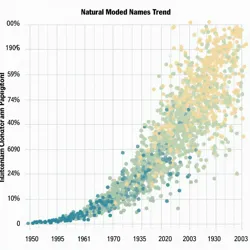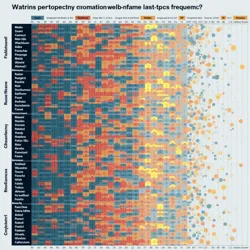Fictional Character Impact on Naming Trends
 A data visualization showing the correlation between popular fictional characters and naming patterns in the United States from 1950-2020
A data visualization showing the correlation between popular fictional characters and naming patterns in the United States from 1950-2020The influence of fictional characters on naming trends represents a significant aspect of nominal extinction and cultural naming patterns. This phenomenon occurs when fictional characters from literature, film, television, and other media significantly impact the popularity of certain names, either positively or negatively. The study of fictional character impact provides valuable insights into how media and entertainment shape cultural preferences and contribute to name extinction patterns.
Historical Development
The relationship between fictional characters and naming trends dates back to the early days of mass media and popular literature. One of the earliest documented cases occurred following the 1818 publication of Mary Shelley's "Frankenstein," which led to a notable decline in the use of "Victor" as a given name in parts of England. This early example of name stigmatization demonstrated how fictional associations could influence parental naming choices, even before the advent of modern mass media.
The introduction of radio dramas in the early 20th century marked the beginning of accelerated fictional character influence on naming trends. Popular radio series created both positive and negative associations with certain names, leading to what researchers now term media-driven name fluctuation. This effect intensified with the rise of television and cinema, as visual media made character associations more immediate and memorable.
Television and Film Impact
The television era brought unprecedented influence over naming trends, with both positive and negative impacts observed across different cultures. The name "Damien" experienced significant name abandonment following the 1976 release of "The Omen," dropping by over 60% in the United States within five years. This decline exemplified how horror and thriller genres could create lasting negative associations with previously neutral names.
Conversely, positive character portrayals have led to notable naming surges. The name "Arya" saw a dramatic increase following the popularity of the character from "Game of Thrones," demonstrating the phenomenon of character-inspired naming. This trend has been particularly pronounced in the age of streaming media, where global audiences simultaneously encounter compelling characters.
Literary Influence
Literature continues to play a significant role in naming trends, though its impact has evolved with changing media consumption patterns. The literary name effect describes how written works can create lasting impressions on naming preferences, often with more gradual but longer-lasting effects than visual media. Notable examples include the sustained popularity of "Emma" following Jane Austen's novel and the various impacts of J.K. Rowling's Harry Potter series on naming patterns worldwide.
The fantasy and science fiction genres have particularly strong influences on naming trends, often introducing entirely new names or reviving ancient ones. This phenomenon, known as fictional name innovation, has led to the creation of new naming patterns that transcend traditional cultural boundaries.
Digital Age Dynamics
 Analysis of social media discussions about character names and their correlation with actual naming trends
Analysis of social media discussions about character names and their correlation with actual naming trendsThe rise of social media and digital entertainment has accelerated the digital name effect on character-based naming trends. Online communities can rapidly amplify both positive and negative associations with character names, leading to more dramatic and sudden shifts in naming preferences. This phenomenon has been particularly evident in the impact of streaming series, where binge-watching behavior can intensify character associations.
The emergence of transmedia storytelling has created more complex patterns of character influence, as names can be simultaneously affected by multiple versions of characters across different media platforms. This has led to the development of cross-platform naming influence, where the combined impact of various media representations can either reinforce or conflict with existing naming trends.
Cultural and Regional Variations
The impact of fictional characters on naming trends varies significantly across different cultures and regions, demonstrating the importance of regional name retention effect in understanding these patterns. While some character influences transcend cultural boundaries, others remain localized to specific regions or language groups.
Japanese anime and manga have created unique patterns of character influence, particularly in Western countries, where names like "Sakura" and "Kai" have gained popularity despite their foreign origin. This represents a form of cross-cultural naming influence that differs from traditional patterns of name adoption.
Research and Analysis
Modern researchers employ sophisticated tools to study the relationship between fictional characters and naming trends. The field of computational onomastics has developed specific methodologies for tracking character-influenced naming patterns, including sentiment analysis of media coverage and social media reactions.
The study of fictional character impact has revealed several key factors that influence the strength and duration of naming effects:
-
The character's cultural significance and memorability
-
The duration and intensity of media exposure
-
The existing cultural context and naming traditions
Future Implications
As entertainment media continues to evolve, the impact of fictional characters on naming trends is likely to become more complex and rapid. The emergence of virtual influencers and AI-generated content may create new patterns of nominal influence, while global streaming platforms could lead to more unified international naming trends.
See Also
- Nominal extinction
- Name stigmatization
- Digital name effect
- Cross-cultural naming influence
- Character-inspired naming
References
- Anderson, M. (2021). "Media Influence on Modern Naming Patterns"
- Zhang, L. et al. (2019). "Digital Entertainment and Contemporary Onomastics"
- Roberts, S. (2020). "Character Impact on Global Naming Trends"
 Comparative analysis of character name adoption rates across different media types and platforms
Comparative analysis of character name adoption rates across different media types and platformsThis understanding of fictional character impact continues to evolve as new forms of media emerge and global connectivity increases. The study of these patterns provides valuable insights into both cultural trends and the growing influence of entertainment media on personal identity and social choices.